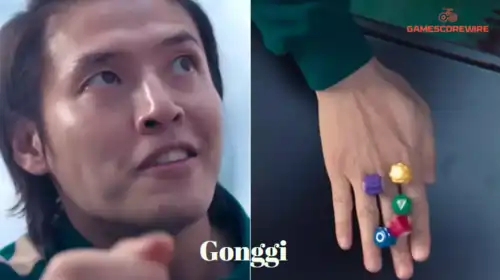
Table of Contents
Introduction
In Squid Game Season 2, Episode 4, “Gonggi” takes center stage as part of the grueling six-legged pentathlon. Rooted in a beloved childhood game, this challenge transforms a seemingly innocent pastime into a tense, high-stakes competition. The episode highlights the series’ signature twist—turning simplicity into terror—by adding strict time constraints and the ever-present threat of elimination.
Overview of the “Gonggi” Game
Basic Rules of the Game
“Gonggi” is a traditional hand game played with five small stones or similar objects. In the Squid Game version, the stones are uniquely shaped as triangles, circles, and squares, painted in vibrant colors. The objective is to follow a series of precise steps:
- Roll and Launch: The player rolls all five stones onto a small table.
- Catch and Collect: The player picks one stone, tosses it into the air, and catches it mid-air while simultaneously picking up another stone from the table.
- Repeat and Increase: The process is repeated with an increasing number of stones thrown and caught mid-air. For instance, in subsequent rounds, the player must toss two stones, then three, and so on, until all five stones are successfully caught.
The game requires accuracy, coordination, and quick reflexes. Missing a catch or failing to grab the stones in the proper sequence forces the player to restart the entire process.
The Twist
While “Gonggi” is already challenging, the Squid Game version introduces a strict time limit. Players must complete all rounds within the allotted time, adding immense pressure. The smallest mistake—a dropped stone or an incorrect sequence—wastes precious seconds and increases the risk of elimination.
The Psychological and Physical Challenges of “Gonggi”
Precision Under Pressure
“Gonggi” demands an extraordinary level of focus and dexterity. The delicate balance between speed and accuracy becomes the ultimate test as players must carefully time their movements while racing against the clock. The constant threat of elimination amplifies the tension, making even the most skilled players susceptible to errors.
Mistakes Are Costly
The need to restart the entire sequence after a mistake adds to the game’s difficulty. A single misstep can erode a player’s confidence and eat away at the limited time, creating a downward spiral of panic and errors.
The Clock Is the Enemy
The ticking timer looms large over the game, intensifying the pressure with every passing second. Players must resist the urge to rush, balancing the need for speed with the precision required to succeed. The psychological strain of watching others succeed—or fail—further heightens the stakes.
Physical Dexterity
“Gonggi” is deceptively demanding on a physical level. Players must demonstrate quick reflexes and fine motor control, especially as the number of stones thrown and caught increases. The shapes of the stones—some angular, others smooth—add an extra layer of complexity.
Key Elements in “Gonggi”
The Stones
The five stones used in “Gonggi” are not uniform, adding to the challenge. Each stone’s unique shape and color require players to adapt their grip and technique. The visual appeal of the stones, painted in bright colors, contrasts sharply with the dark stakes of the game, emphasizing the twisted innocence of Squid Game’s challenges.
The Table
The small playing surface forces players to work within a confined space. The limited area heightens the difficulty of rolling, picking up, and catching the stones without knocking others off the table.
The Players
Each contestant approaches the game differently, showcasing a range of strategies and emotional responses:
- Nervous Perfectionists: These players are methodical but prone to panic when time runs low.
- Risk-Takers: They attempt to move quickly but are more likely to make errors.
- Experienced Players: Those familiar with “Gonggi” have an advantage, though the high stakes often level the playing field.
Themes and Symbolism in “Gonggi”
Innocence Corrupted
Like other games in Squid Game, “Gonggi” transforms a nostalgic childhood activity into a harrowing ordeal. This juxtaposition reflects the series’ overarching theme: the loss of innocence under the crushing weight of societal and personal pressures.
High Stakes of Small Mistakes
The game’s unforgiving nature symbolizes how even minor missteps in life can have devastating consequences, especially for those living under constant pressure and fear.
The Illusion of Simplicity
While “Gonggi” appears simple, its execution is anything but. This mirrors real-world challenges where tasks may seem straightforward until unforeseen complexities arise under pressure.
Time as a Tyrant
The game’s strict time limit serves as a metaphor for societal deadlines and the relentless race against the clock, where individuals are pushed to their limits with little room for error.
Impact on Viewers
The “Gonggi” challenge captivates viewers with its blend of nostalgia and suspense. Its simplicity, coupled with the high stakes, creates a gripping narrative that leaves audiences on edge. The intricate movements and nerve-wracking timer make “Gonggi” one of the standout games of Season 2.
Final Thoughts
“Gonggi” in Squid Game Season 2, Episode 4, showcases the series’ ability to elevate even the simplest childhood games into thrilling and heart-pounding spectacles. With its combination of dexterity, precision, and relentless time pressure, the game highlights the fragility of human skill under extreme conditions. As players battle against the clock and their own nerves, “Gonggi” delivers a powerful commentary on the consequences of high-pressure systems and the thin line between success and failure.
Disclaimer: This article is for informational and entertainment purposes only. It discusses fictional content from the television series Squid Game. All rights to the series, characters, and related content belong to their respective creators and copyright holders.








